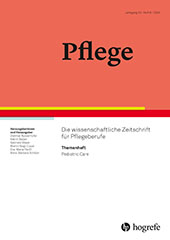Zwischen Himmel und Hölle: Erfahrungen von Eltern mit einem kritisch kranken Kind mit extrakorporaler Membranoxygenierung (ECMO) - Eine qualitative-explorative Studie mit Paarinterviews
Abstract
Zusammenfassung.Hintergrund: Wenn ein Kind infolge einer schweren Erkrankung intensive Pflege und medizinische Versorgung braucht, ist das für Eltern traumatisch. Dies wird für sie noch herausfordernder, wenn eine technisch hochspezialisierte Therapie, wie die extrakorporale Membranoxygenierung (ECMO) auf der pädiatrischen Intensivstation nötig ist. Ziel: Das Ziel der Studie ist, aus den Erfahrungen betroffener Eltern typische Muster für deren Bedürfnisse sowie entsprechende Handlungsoptionen von Gesundheitsfachpersonen abzuleiten. Methode: Die qualitativ-explorative Studie untersuchte mit narrativen Paarinterviews die Erfahrungen von sechs Elternpaaren, deren Kind eine ECMO erhält oder im vergangenen Jahr erhalten hat. Die Transkripte wurden mithilfe intensiven Paraphrasierens und induktiven Kodierens analysiert. Ergebnisse: Die Situation der Eltern ist geprägt durch das Phänomen der Ambivalenz mit den gleichzeitigen Gefühlen von Hoffnung und Angst. Sie erkennen die Lebensgefahr ihres Kindes, was zu einer großen Hilflosigkeit mit starken emotionalen Reaktionen führt. Es zeigt sich, dass es zu wenig Passung zwischen der Gefühlswelt der Eltern und den Handlungsmustern der Gesundheitsfachpersonen gibt. Schlussfolgerungen: Die Denklogik der Gesundheitsfachpersonen baut auf professionellen Kriterien, wie der Lebensbedrohung und den Risiken der ECMO auf, welche die emotionalen Bedürfnisse der Eltern außer Acht lässt. Aus dem Grund ist es wichtig, sensibler auf die Eltern zu zugehen und auch positive kleine Zeichen zum Gesundheitszustand und der Leidensfähigkeit ihres Kindes mit ihnen zu teilen.
Abstract.Background: It is a traumatic experience for parents when their child’s severe illness necessitates a period of intensive care. This situation becomes even more challenging for parents if a highly technical therapy such as extracorporeal membrane oxygenation (ECMO) in the Pediatric Intensive Care Unit is required. Aim: The study explores the experiences of parents of critically ill children undergoing ECMO therapy with the aim of better understanding their needs and identifying courses of action for healthcare professionals. Method: The qualitative-explorative study was based on interviews with six couples whose critically ill child is or has been receiving ECMO during the last year, which were used to examine their experiences. The analysis of six such interviews was performed using intensive paraphrasing and inductive coding. Results: The parents’ situation can be best characterised as ambivalent with simultaneous feelings of hope and fear. They recognize the danger to their child’s life, leading to intense feelings of helplessness with strong emotional reactions. It becomes apparent that there is too little fit between the emotional world of the parents and the action patterns of the health care professionals. Conclusions: The health care professionals thinking logic is based on professional criteria, such as the life threat and risks of ECMO, which ignores the emotional needs of the parents. For this reason, it is important to be more sensitive to the parents and to share positive little signs about their child’ s state of health and ability to suffer with them.
Literatur
(2003). Parental experience of highly technical therapy: Survivors and nonsurvivors of extracorporeal membrane oxygenation support. Pediatric Critical Care Medicine , 4 (2), 214 – 219.
(2020). ECMO: Extracorporeal Membrane Oxygenation . (Konzept erhältlich vom Universitäts-Kinderspital Zürich, Abteilung für Intensivmedizin und Neonatologie, Steinwiesstrasse 75, 8032 Zürich, Schweiz).
(2017). Qualitative Sozialforschung. Eine Einführung . Reinbek bei Hamburg: Rowohlt Taschenbuch Verlag.
(2014). Psychological reactions in family members of patients hospitalised in intensive care units. Anaesthesiology Intensive Therapy , 46 (1), 42 – 45.
(2013). Der schöpferische Sprung. Vom therapeutischen Umgang mit Krisen . Ostfildern: Patmos der Schwabenverlag AG.
(2016). Schöpferisch Leben . Ostfildern: Patmos der Schwabenverlag AG.
(2013). Evolution of Technology, Establishment of Program, and Clinical Outcomes in Pediatric Extracorporeal Membrane Oxygenation: The “SickKids” Experience. Artificial Organs , 37 (1), 21 – 28.
(2015). Qualitative Interviewforschung. Ein integrativer Ansatz . Weinheim und Basel: Beltz Juventa.
(2014). Parental Symptoms of Posttraumatic Stress After Pediatric Extracorporeal Membrane Oxygenation. Pediatric Critical Care Medicine , 15 (2), 80 – 88.
(2012).
Menschen als “homines ambivalentes” . In D. Korczak (Hrsg.), Ambivalenzerfahrungen . Kröning: Asanger Verlag GmbH.(2013). The Coding Manual for Qualitative Researchers . Los Angeles, London, New Delhi, Singapore, Washington DC: SAGE Publications.
(1996). Grounded Theory: Grundlagen Qualitativer Sozialforschung . Weinheim: Beltz Psychologie Verlags Union.
(2017). Psychological Outcomes in Parents of Critically Ill Hospitalized Children. Journal of Pediatric Nursing , 34 , 36 – 43.
Swissethics (2017). Leitfaden Bedenkfrist. Bern Verfügbar unter https://www.swissethics.ch/doc/leitfaden_pos/Bedenkzeit_final_d.pdf [07.06.2019].(2017). Menschliche Kommunikation. Formen, Störungen, Paradoxien . Bern: Hogrefe Verlag.
(2017). Das Paarinterview . Wiesbaden: Springer VS.



